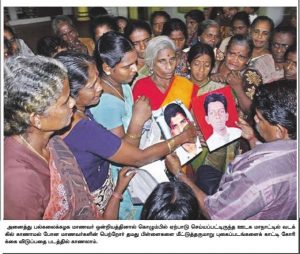July 26 (NIA): Families of Sri Lanka’s missing persons, 10,900 of whom are civilians and mostly Tamil, would like to have governmental assistance to cope with the loss of a breadwinner. But more importantly, they would like the government to trace the missing member or let them know about his whereabouts, a recent study by the International Committee of the Red Cross (ICRC) reveals.
Between October 2014 and November 2015, the ICRC met 395 families of missing persons, including those of missing security forces and police personnel, along with the authorities and organizations providing assistance to these victims. Of the 16, 000 missing, 5,100 are from the Security Forces which battled the Liberation Tigers of Tamil Eelam (LTTE) over a number of years.
“Of the families interviewed, 36 percent believed their loved ones to be dead, 31 percent were convinced that they were still alive, and 33 percent expressed uncertainty. But regardless of their beliefs, a constant vacillation between hope and fear was recorded among all families. Those who expressed the belief that their relatives were dead maintained the hope that they may still be alive, while those who believed that they were alive, still feared that their relatives might be dead.”
“Believing their missing relatives might be dead or being unsure of their fate, did not prevent the families from expressing a need to receive more detailed information from the authorities as to the fate and whereabouts of their missing relatives. Over two thirds of the interviewed families expressed such a need,” the report said.
Further 79 percent of the interviewed families also mentioned, at least once, the need for information on the location of buried human remains and/or to receive the identified remains of their relatives. Understandably, all those who believed their missing relatives to be alive wanted to know where they are.
Consequences of Ambiguity
“Ambiguous loss”, which is caused by the uncertainty about the fate and whereabouts of their missing relatives, entails a state of perpetual suffering, in which the life of the families of missing persons is put on hold, freezing the natural grieving process and giving rise to feelings of frustration and helplessness, the ICRC report observed.
“This suffering, when combined with economic, administrative and other stress-factors, is proven to lead to serious health problems, including anxiety and depression,” it said.

No Takers For Counseling
But surprisingly, few wanted to avail of counseling. Of the 395 families interviewed, a mere 2 percent suggested that counseling could be useful. This is because, in Sri Lanka, counseling is confused with psychiatric treatment for the mentally ill. The grieving members of the families of the missing do not consider themselves as mentally ill.
However, 70 percent expressed a desire to talk about their missing relative with an understanding collocutor, and 75 percent expressed the need to participate in group commemorative events relating to their missing relatives.
The ICRC found a correlation between ambiguous loss, economic difficulties and mental health issues faced by the families of missing persons. For example, out of 56 percent of all families that expressed economic difficulties, 86 percent showed symptoms of anxiety or depression.
Economic Problems
A high rate of unemployment (56 percent) was recorded among the families interviewed. The fact that in 93 percent of the families interviewed, the missing relative was a male, meant that in most cases, women were forced to take on the role of the breadwinner or else rely on the support of other male relatives.
However, this phenomenon seemed to have much less effect on families of armed forces men who went Missing in Action (MIA), since they are eligible for a range of government-sponsored compensation schemes, the report noted.
Reject Death Certificates
The majority of the interviewed families said that they face serious bureaucratic difficulties in the management of family assets registered under the name of the missing person. The fact that Sri Lankan law does not recognize the status of a person as “missing”, obliges families to obtain a Death Certificate to carry out basic administrative tasks (e.g. access/close the bank account of the missing person, claim the monthly salary of the missing person deposited by the employer, or reclaim land owned by the missing person.
But despite this situation, 66 percent of the interviewed families stated they had refused to accept a Death Certificate until the death was proven. Out of the families that had accepted a Death Certificate, almost half stated they would have preferred to have a ‘Certificate of Absence’ if it had been available.
Cognizant of this problem, the Sirisena-Wickremesinghe government recently decided to issue “Certificates of Absence” in lieu of a Death Certificate.
Bureaucratic Hurdles
Families also reported administrative problems in accessing benefit schemes such as a lack of clear information on who is eligible to which schemes, lack of response to applications, and inability to provide necessary documentation.
The ICRC report reveals an inconsistency between schemes available to families of those ‘Missing in Action’ (involving armed forces personnel), and those of missing persons, who were not in the armed forces.
Acknowledgement of Suffering
Thirty four percent of the families interviewed expressed the need for justice. Of these, the majority (17 percent) asked for “reparative justice”, while 11 percent asked for “retributive justice”, and 6 percent asked for both.
The most frequently demanded form of “reparative justice” was financial assistance, but interestingly “only if accompanied by acknowledgement of their suffering and difficulties on the part of the authorities, and not presented as simple financial compensation for the life of their loved one,” the ICRC says.
Twenty three percent of families asked for some form of acknowledgement by the authorities of their loss – whether symbolic (in the form of a monument, road name etc.), ceremonial, or otherwise, like declaring a day of the missing, public acknowledgement, or conferring respect/privileges.
























































